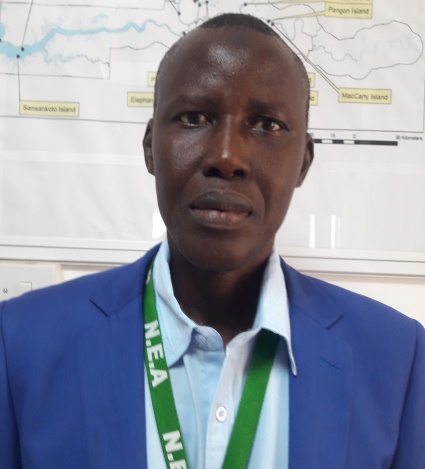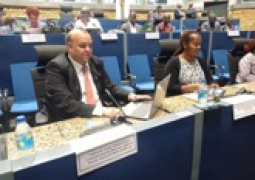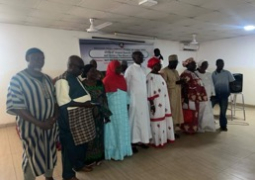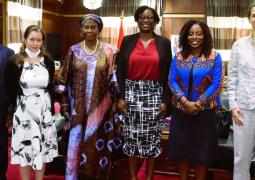
While the use of chemicals in all human activities (e.g. agriculture, health, energy production, manufacture, services and residential) contributes to improving the quality of life, he said it also raises concerns about its harmful effects on workers, consumers, the environment and society at large through exposure.
Furthermore, the Gambian Scientist revealed that accidental releases from the distribution, consumption and disposal of chemicals may permanently damage soil, water and air. This is why, he said, all institutions present at this conclave have a vital role to play in the management of chemicals in The Gambia. Dr. Badgie made this declaration during a consultation workshop on Capacity Building for the implementation of the Multilateral Environment Agreements (MEA`s) in the Gambia.
“The Gambia government has shown full time commitment to the protection of the environment as a vital component of sustainable development. In line of this, the government of The Gambia has partnered with development partners such as GEF and UNEP in the implementation of Various Multilateral environment Agreements such as those dealing with the sustainable and sound management of chemicals and waste. Chemicals are very important substances in our various activities in life; however, they pose certain risks to our health and the environment,” he pointed out.
The Stockholm Convention is a legally binding international instrument, designed to lead to gradual decrease of the presence of persistent organic pollutants in the environment. The Gambia is a party to the Stockholm Convention on Persistent Organic Pollutants (POPs). Persistent Organic Pollutants (POPs) are toxic chemicals that adversely affect human health and the environment around the world. Because they can be transported by wind and water, most POPs generated in one country can and do affect other people and wildlife far from where they are used and released. They persist for long periods of time in the environment and can accumulate and pass from one species to the next through the food chain.
Dr. Badjie told the gathering that the Gambia Government in partnership with UNEP Special Programme Secretariat is implementing this important project as part of the implementation of the Stockholm Convention on Persistent Organic Pollutants (POPs), The Basel Convention on control of trans-boundary movement of hazardous wastes and their disposal, The Rotterdam Convention on the Prior Informed Consent Procedure, The Minamata Convention on Mercury and Strategic Approach to International Chemicals Management (SAICM).
He noted that the consultative gathering aimed at raising public awareness on the situation of chemicals and their related issues, in an effort to enlighten people living in The Gambia on sound chemical management. Some of the expected outcomes of institutional strengthening through the Special Program are to develop and monitor the implementation of national policies, strategies, programmes and legislation for the sound management of chemicals and wastes; Promote the adoption, monitoring and enforcement of legislation and regulatory frameworks for the sound management of chemicals and wastes. In addition, to promote the mainstreaming of the sound management of chemicals and wastes into national development plans, national budgets, policies, legislation and implementation frameworks at all levels, including addressing gaps and avoiding duplication.
Recounting on Gambia`s effort, he said the Gambia have ratified all the aforementioned conventions with the ultimate aim to protect human health and the environment, and The Gambia has recognized the need towards the development of an institutional framework for the sound management of chemicals and waste to enhance implementation at national level. To meet her obligations under these Conventions, The Gambia had to prepare a project proposal and submitted it to the Special Programme (SP) Secretariat for funding. NEA`s Deputy Executive publicized.
“The objective of the Special Programme is to support country-driven institutional strengthening at the national level, in the context of an integrated approach to address the financing of the sound management of chemicals and wastes, taking into account the national development strategies, plans and priorities of each country, to increase sustainable public institutional capacity for the sound management of chemicals and wastes throughout their life cycle. Institutional strengthening under the Special Programme will facilitate and enable the implementation of the chemical convention to which The Gambia is a State Party.”
The Governor of Lower River Region Rohey John Manjang, who presided over the dialogue said this consultative forum is being held to gain deeper understanding of the chemical conventions since they impact on many sectors, including policy-making, law-making, environmental protection, and public health, industry and the private sector and various interest groups.I would therefore request you through your influence and clout to play pro-active roles in achieving our desired goals in environmental preservation. She finally concluded, “I challenge all of us both individually and collectively to demonstrate our commitments towards meeting our national obligations in the implementation of the MEAs.”





